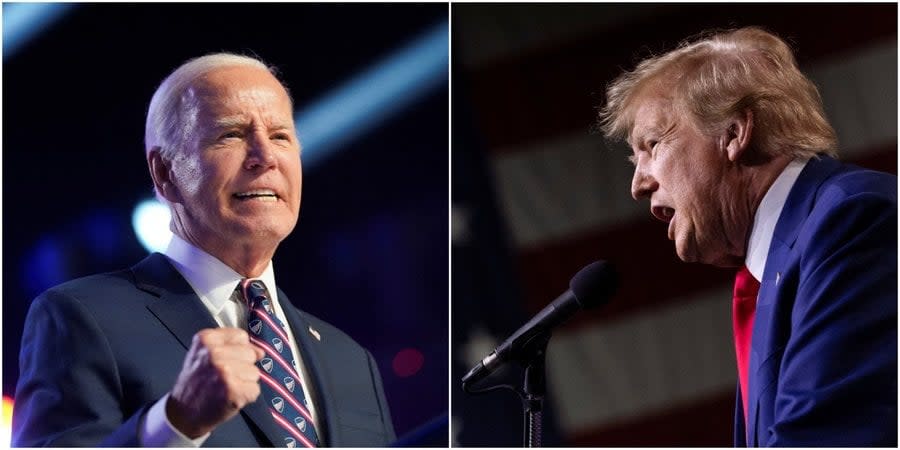It's going to be hot on the other side of the ocean

- Oops!Something went wrong.Please try again later.
- Oops!Something went wrong.Please try again later.
- Oops!Something went wrong.Please try again later.
- Oops!Something went wrong.Please try again later.
- Oops!Something went wrong.Please try again later.
- Oops!Something went wrong.Please try again later.
The US election campaign, the complicated relations between Argentina and Brazil, and an unpopular government in Canada will keep diplomats working 24/7.
While the main intrigue in American politics until mid-2023 was whether Donald Trump would be imprisoned before Election Day, the most important question now is whether the Democratic Party will split into those who support Joe Biden's re-election bid and those who will demand that the US president give way to a new candidate.
An interesting paradox: serious difficulties with unity within the Democratic camp have opened a window of opportunity for Trump's opponents in the Republican Party.
For if the "donkeys" (and this animal is the symbol of the Democratic Party) nominate a successful governor (California's Gavin Newsom or charismatic Gretchen Whitmore from Michigan) instead of the unpopular "Grandpa Joe" or, gritting their teeth, agree to support a moderate senator (Joe Manchin from West Virginia), the "elephants"' bet on the toxic Trump becomes very risky. Nevertheless, donors and the GOP establishment (the grand old party's nickname for the Republicans) may focus on capturing a majority in both houses of Congress.
A scenario where the US election results in a Democratic president and a Republican-controlled Congress has several risks and opportunities for Ukraine.
Ukraine can benefit from such a competition
On the one hand, Trump's defeat will lead to increased moderation in domestic and consistency in US foreign policy: Ukraine, Taiwan, and Israel will have stable support. On the other hand, Kyiv will need to redouble its efforts to maintain bipartisan support and prove that the Ukrainian government has broken with the corrupt practices of the past.
Meanwhile, an epic struggle between two polarized conceptions of a "welfare state" could occur in the southern part of the Western Hemisphere. On the one hand, Brazilian President Lula da Silva, a center-leftist, is trying to rebuild “capitalism with a human face” and restore the country's prestige after four chaotic years of Jair Bolsonaro's rule. On the other hand, the newly elected president of Argentina, self-proclaimed libertarian Javier Milei, will try to carry out a "revolution from above" and dismantle the corrupt and inefficient welfare state.
The two leaders can't stand each other, but they have no right to ignore the close economic ties between the Brazilian and Argentine economies. Lula sincerely believes in the usefulness of state protectionism and promoting national exports, even if it means deepening relations with China or Russia. On the other hand, Milei wants to break with autocrats like Xi Jinping and create business conditions that would attract major Western corporations or promising unicorns to the country, which would help pull it out of the debt hole.
Ukraine can benefit from such a competition if each country cooperates with us on issues that are a priority for them. In particular, Brazil, as a member of the G20 and BRICS, may be close to the ideal of an "honest broker" in preparing a fair peace agreement. Despite its dependence on Russian fertilizer and diesel fuel supplies, Brazil's leadership remains committed to the constitutional principle of respect for human rights in foreign policy. The release of all prisoners, the return of abducted children, the de-occupation of the Zaporizhzhia nuclear power plant, and the cessation of shelling of Ukrainian Black Sea ports - these Ukrainian demands are understood in Brazil, and it will be very difficult for the Russians to ignore this request without consequences. Meanwhile, Argentina could become a Latin American hub for the production of military products needed by Ukraine, including ammunition and drones based on Israeli technology. This perfectly combines Miley's intention to develop national production and political partnerships with Western democracies.
A few words about Canada: unlike the United States, economic and military assistance to Ukraine has not become a subject of inter-party and election games here. The Canadian government has no politically motivated restrictions on the supply of equipment or ammunition. However, the country could be doing better with economic growth. Amid the threat of a recession two years before the general election, voices favoring focusing resources on domestic needs are growing. The pressure from the right-wing opposition will not allow Prime Minister Trudeau to reduce his support for Ukraine in 2024, as he risks being seen as a Trump follower and losing the support of millions of voters. However, in this situation, Kyiv should also work with Ottawa to agree on priorities for support in 2024 to avoid creating unnecessary problems for a valuable ally.
We’re bringing the voice of Ukraine to the world. Support us with a one-time donation, or become a Patron!
Read the original article on The New Voice of Ukraine

